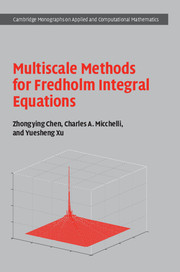Book contents
- Frontmatter
- Contents
- Preface
- List of symbols
- Introduction
- 1 A review of the Fredholm approach
- 2 Fredholm equations and projection theory
- 3 Conventional numerical methods
- 4 Multiscale basis functions
- 5 Multiscale Galerkin methods
- 6 Multiscale Petrov–Galerkin methods
- 7 Multiscale collocation methods
- 8 Numerical integrations and error control
- 9 Fast solvers for discrete systems
- 10 Multiscale methods for nonlinear integral equations
- 11 Multiscale methods for ill-posed integral equations
- 12 Eigen-problems of weakly singular integral operators
- Appendix Basic results from functional analysis
- References
- Index
12 - Eigen-problems of weakly singular integral operators
Published online by Cambridge University Press: 05 July 2015
- Frontmatter
- Contents
- Preface
- List of symbols
- Introduction
- 1 A review of the Fredholm approach
- 2 Fredholm equations and projection theory
- 3 Conventional numerical methods
- 4 Multiscale basis functions
- 5 Multiscale Galerkin methods
- 6 Multiscale Petrov–Galerkin methods
- 7 Multiscale collocation methods
- 8 Numerical integrations and error control
- 9 Fast solvers for discrete systems
- 10 Multiscale methods for nonlinear integral equations
- 11 Multiscale methods for ill-posed integral equations
- 12 Eigen-problems of weakly singular integral operators
- Appendix Basic results from functional analysis
- References
- Index
Summary
In this chapter we consider solving the eigen-problem of a weakly singular integral operator K. As we know, the spectrum of a compact integral operator K consists of a countable number of eigenvalues which only have an accumulation point at zero that may or may not be an eigenvalue. We explain in this chapter how the multiscale methods can be used to compute the nonzero eigenvalues of K rapidly and efficiently. We begin with a brief introduction to the subject.
Introduction
Many practical problems in science and engineering are formulated as eigenproblems of compact linear integral operators (cf. [44]). Standard numerical treatments of the eigen-problem normally discretize the compact integral operator into a matrix and then solve the eigen-problem of the resulting matrix. The computed eigenvalues and associated eigenvectors of the matrix are considered approximations of the corresponding eigenvalues and eigenvectors of the compact integral operator. In particular, the Galerkin, Petrov–Galerkin, collocation, Nyström and degenerate kernel methods are commonly used methods for the approximation of eigenvalues and eigenvectors of compact integral operators. It is well known that the matrix which results from a discretization of a compact integral operator is dense. Solving the eigenproblem of a dense matrix requires a significant amount of computational effort. Hence, fast algorithms for solving such a problem are highly desirable.
We are interested in developing a fast collocation method for solving the eigen-problem of a compact linear integral operator K on the L∞(Ω) space with a weakly singular kernel. Wavelet and multiscale methods were recently developed (see, for example, [28, 64, 67, 68, 95, 108, 202] and the references cited therein) for numerical solutions of weakly singular Fredholm integral equations of the second kind. Some of them were discussed in the previous chapter. The essence of these methods is to approximate the dense matrix that results from the discretization of the integral operator by a sparse matrix and solve the linear system of the sparse matrix.
- Type
- Chapter
- Information
- Multiscale Methods for Fredholm Integral Equations , pp. 465 - 487Publisher: Cambridge University PressPrint publication year: 2015



